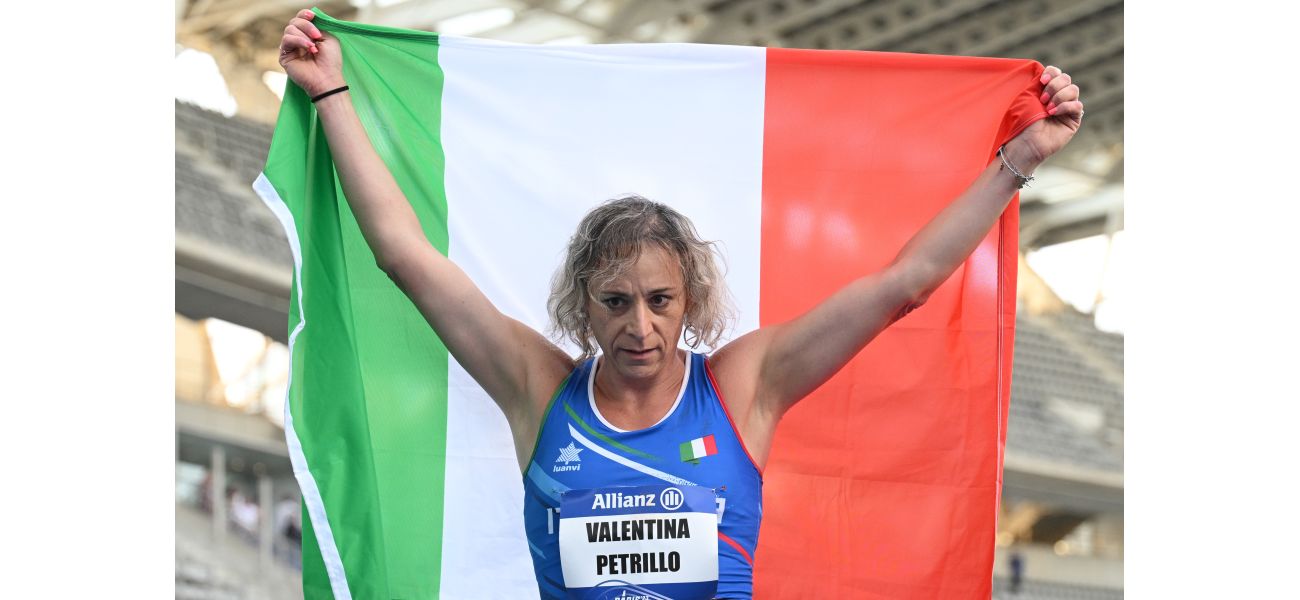A transgender athlete faced discrimination after qualifying for the Paralympics.
Valentina's treatment highlights ongoing stigma and exclusion faced by transgender individuals, despite progress made in acceptance.
August 29th 2024.

As the Olympic season approaches, there are certain things that we can expect to see: world records being broken, memes being made, new sporting heroes emerging, heartwarming moments, and learning more about the host nation. However, there is another topic that seems to have become a regular part of the conversation surrounding the Olympics and Paralympics – the inclusion of transgender athletes.
As a transgender person myself, I have been watching with concern as the discussion around our participation in sports has become increasingly heated in recent years. It seems that every major sporting event brings with it a wave of criticism and backlash against trans individuals participating. Some international sporting associations have even gone as far as banning trans women from elite sports, including more niche activities like chess.
Sadly, with every instance of this discourse arising, there is one unfortunate athlete who becomes the target of abuse. Last year, it was New Zealand weightlifter Laurel Hubbard who faced the brunt of the vitriol, despite finishing last. And this year, it looks like it will be Italian trans woman Valentina Petrillo, who is set to compete at the Paris Paralympic Games in the T12 200 and 400m sprints. Valentina, who is 50 years old, previously won bronze medals at the World Para Athletics Championship in Paris last year.
It brings me joy to see that the Paralympics, which is run by the International Paralympic Committee (IPC) – a separate organization from the International Olympic Committee – is championing inclusion in this way. Andrew Parsons, the IPC President, has stated that Valentina is welcome to compete under their policies. However, he also called for a "united" position on trans athletes in sports, which could potentially bring both good and bad news.
For example, World Athletics has already banned trans women from competing in the female category, and I do not want to see the Paralympics follow suit. One thing that is clear is that Valentina does not deserve the level of vitriol and abuse she has received. On social media, we see the usual anti-trans voices misgendering Valentina, claiming she has an unfair advantage, making derogatory comments about her age, and even speculating about her visual impairment.
This treatment of Valentina only serves to highlight the extreme levels of stigma and exclusion still faced by transgender individuals in our society. It is ironic that her presence at the Paralympics is crucial because banning trans women from elite sports will only add to this sense of exclusion. What frustrates me the most is how many people suddenly seem to have a vested interest in women's sports and the Paralympics, without ever showing any interest before. A transgender participant seems to be enough to turn them into experts on T12 sprinting events.
The reaction to Valentina is just another opportunity for people to display their prejudice and disdain towards trans individuals. But the reality is very different. For anyone who truly cares about women's sports and their well-being, there are much more pressing and important issues than a trans woman competing at the Paralympics. A report from UNESCO in July showed that women's access to sports is still lagging far behind and urgently called for their member states to address the inequalities facing women in sports at all levels.
These challenges include gender-based violence, higher dropout rates for girls, and the lack of women in leadership roles in sports. However, from what I have seen, those who are the loudest about trans inclusion in sports never seem to address these issues. This leads me to believe that their outrage is not really about women's rights and well-being, but rather about their misguided prejudice towards trans individuals.
In my opinion, banning trans people from participating in line with their gender identity goes against the very spirit of sports, which is about friendship, solidarity, and fair play. With the Olympics leaving these decisions up to individual sporting bodies, it is crucial for these organizations to acknowledge and take responsibility for the impact their actions can have. They need to take a good, hard look at how they are going against everything that sports stand for.
I hope that the Paralympics will stand firm on their policy of inclusion, and that the Olympics will follow suit. Not only because it is fair, but because it is the right thing to do. I hope that Valentina will be able to compete and enjoy the Games like any other Olympian, without facing the barrage of abuse that trans athletes have faced in recent years. She has been cleared to compete and has done nothing wrong. Her achievements should not be questioned, but instead celebrated and respected like those of all other competitors at the Paralympics.
Exclusion will not achieve anything positive, and those who support it have fundamentally misunderstood the foundation and purpose of sports at its most basic level. We all deserve the same opportunities, respect, dignity, and solidarity – and that includes trans athletes. As always, I encourage you to share your own stories and views in the comments below.
As a transgender person myself, I have been watching with concern as the discussion around our participation in sports has become increasingly heated in recent years. It seems that every major sporting event brings with it a wave of criticism and backlash against trans individuals participating. Some international sporting associations have even gone as far as banning trans women from elite sports, including more niche activities like chess.
Sadly, with every instance of this discourse arising, there is one unfortunate athlete who becomes the target of abuse. Last year, it was New Zealand weightlifter Laurel Hubbard who faced the brunt of the vitriol, despite finishing last. And this year, it looks like it will be Italian trans woman Valentina Petrillo, who is set to compete at the Paris Paralympic Games in the T12 200 and 400m sprints. Valentina, who is 50 years old, previously won bronze medals at the World Para Athletics Championship in Paris last year.
It brings me joy to see that the Paralympics, which is run by the International Paralympic Committee (IPC) – a separate organization from the International Olympic Committee – is championing inclusion in this way. Andrew Parsons, the IPC President, has stated that Valentina is welcome to compete under their policies. However, he also called for a "united" position on trans athletes in sports, which could potentially bring both good and bad news.
For example, World Athletics has already banned trans women from competing in the female category, and I do not want to see the Paralympics follow suit. One thing that is clear is that Valentina does not deserve the level of vitriol and abuse she has received. On social media, we see the usual anti-trans voices misgendering Valentina, claiming she has an unfair advantage, making derogatory comments about her age, and even speculating about her visual impairment.
This treatment of Valentina only serves to highlight the extreme levels of stigma and exclusion still faced by transgender individuals in our society. It is ironic that her presence at the Paralympics is crucial because banning trans women from elite sports will only add to this sense of exclusion. What frustrates me the most is how many people suddenly seem to have a vested interest in women's sports and the Paralympics, without ever showing any interest before. A transgender participant seems to be enough to turn them into experts on T12 sprinting events.
The reaction to Valentina is just another opportunity for people to display their prejudice and disdain towards trans individuals. But the reality is very different. For anyone who truly cares about women's sports and their well-being, there are much more pressing and important issues than a trans woman competing at the Paralympics. A report from UNESCO in July showed that women's access to sports is still lagging far behind and urgently called for their member states to address the inequalities facing women in sports at all levels.
These challenges include gender-based violence, higher dropout rates for girls, and the lack of women in leadership roles in sports. However, from what I have seen, those who are the loudest about trans inclusion in sports never seem to address these issues. This leads me to believe that their outrage is not really about women's rights and well-being, but rather about their misguided prejudice towards trans individuals.
In my opinion, banning trans people from participating in line with their gender identity goes against the very spirit of sports, which is about friendship, solidarity, and fair play. With the Olympics leaving these decisions up to individual sporting bodies, it is crucial for these organizations to acknowledge and take responsibility for the impact their actions can have. They need to take a good, hard look at how they are going against everything that sports stand for.
I hope that the Paralympics will stand firm on their policy of inclusion, and that the Olympics will follow suit. Not only because it is fair, but because it is the right thing to do. I hope that Valentina will be able to compete and enjoy the Games like any other Olympian, without facing the barrage of abuse that trans athletes have faced in recent years. She has been cleared to compete and has done nothing wrong. Her achievements should not be questioned, but instead celebrated and respected like those of all other competitors at the Paralympics.
Exclusion will not achieve anything positive, and those who support it have fundamentally misunderstood the foundation and purpose of sports at its most basic level. We all deserve the same opportunities, respect, dignity, and solidarity – and that includes trans athletes. As always, I encourage you to share your own stories and views in the comments below.
[This article has been trending online recently and has been generated with AI. Your feed is customized.]
[Generative AI is experimental.]
0
0
Submit Comment





